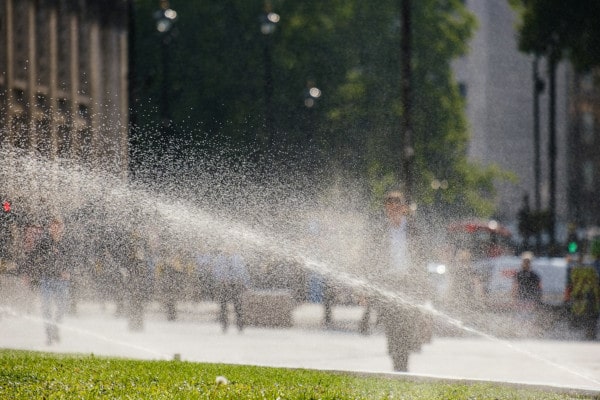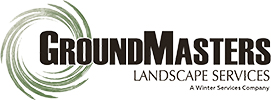
In today’s era of environmental consciousness and sustainable living efforts, efficient water usage has become incredibly important for landscaping. As the hot summer sun beats down on Denver, it can be difficult to both maintain a healthy landscape and comply with local water regulations without proper watering strategies. Mastering the art of efficient commercial landscape irrigation is the key to combating drought conditions and adopting eco-friendly landscape practices.
In this article, we would like to share some tips that will help commercial property owners preserve both water and their property’s appearance during the hot summer months:
7 Summer Watering Tips for Denver Commercial Properties
Water Early in the Morning or Late in the Evening
According to Denver Water’s summer watering rules, (in effect from May 1st to Oct 1st) lawn watering is NOT allowed between 10:00am and 6:00pm. Due to our hot and dry climate, it’s best to water early in the morning (between 6:00am – 10:00am) and later in the evening (between 6:00pm – 9:00pm). This is due to:
- Lower Temperatures: Cooler temperatures reduce water evaporation, allowing more water to soak into the soil
- Calmer Winds: It’s generally less windy in the early morning and late evening, preventing water from being blown away and wasted
- Better Overall Plant Health: Watering in the early morning and late evening helps plants absorb water more effectively, helping them to better withstand the heat during the day
Water Deeply But Infrequently with Soaker Hoses
Deep watering with soaker hoses is incredibly effective and water-efficient. This is because soaker hoses deliver water slowly and directly to the surface of the soil near the plant roots, minimizing evaporation and runoff. Running the soaker hose for 1-2 hours will allow water to penetrate deeply into the soil, which promotes healthier root growth. In the Denver area, where soil is often clay-like or sandy, it’s best to run soaker hoses every 4-5 days, but be sure to monitor soil moisture levels at around 6-8 inches to ensure that roots are still receiving enough water.
Use Drip Irrigation
Drip irrigation also delivers water directly to the base of plants, but it provides a slow and consistent supply of water throughout the watering period. The small drips are extremely water efficient, which can lead to significant savings on water bills. Drip systems also tend to require less maintenance and cheaper repairs compared to traditional irrigation systems. Drip irrigation systems can be easily adjusted and customized to meet the specific needs of different plants, making them a very cost-effective solution.
Group Plants with Similar Water Needs
Grouping plants with similar needs (aka hydrozoning) is a highly effective solution for minimizing water waste and ensuring healthier plant growth. Hydrozoning ensures that plants with similar water needs get the right amount of water compared to other plants, preventing overwatering or underwatering. Being able to better control water usage for certain groups of plants leads to reduced water waste and better overall plant health. Hydrozoning also makes it easier to lay out irrigation zones and adjust the watering schedule of each zone, making it incredibly water efficient.
Mulch Around Plants and Trees
Mulching can have a tremendous effect on the physical appearance of flowerbeds and around trees, but it is also incredibly beneficial for watering in the summer. Mulch acts as a natural insulator, helping to retain soil moisture, preventing areas of the property from drying out in the hot sun. Mulching is especially effective at helping irrigation when paired with drip lines or soaker hoses, which can be installed underneath the mulch to better retain soil moisture levels.
Choose Drought-Tolerant Plants
Optimizing water usage can be tricky when selecting plants that aren’t used to the local soil and weather conditions. Luckily, there is an incredible range of beautiful native Colorado plants that are well acclimated to the heat and dry conditions. Choosing drought-resistant plants can reduce your watering needs significantly, and in the case of properties with xeriscaping, they may require almost zero water at all. Incorporating native plants and xeriscaping principles into your landscape can drastically reduce water bills and maintenance costs.
Install Smart Irrigation Systems
One of the best ways to optimize water usage is to install smart irrigation systems. Smart systems utilize real-time data to make watering adjustments, ensuring that plants receive the right amount of water based on current weather and soil conditions. This real-time monitoring makes smart irrigation systems incredibly efficient, getting the most out of every drop of water and lowering water bills. Smart systems can also shut off the system when they detect damaged components or other issues, preventing water waste.
Make Sure Your Denver Commercial Property Can Beat The Heat With GroundMasters Landscape Services
With close to 30 years of experience, our team of lawn, plant, and tree care experts can help your property stay watered and well-maintained during even the hottest Colorado summers.
GroundMasters provides a full range of seasonal commercial landscape services, and we would love to be your year-round full service provider.
To see what GroundMasters can do for your Denver area business or commercial property, give us a call today at (303) 750-8867 or get in touch with us online to get started.
